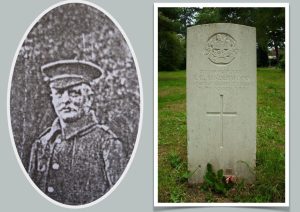13th Battalion, Gloucestershire Regiment (Forest of Dean Pioneers)

Thomas Charles Underwood was born in Tewkesbury in 1876, the son of Frederick and Martha of Well Alley. In 1891, aged 15, he was working as a coal miner in Cwmbran, Monmouthshire.
In the autumn of 1899 he had returned and married Sylvia Hannah Gardner; subsequently they had six children (of whom one had died by the time of the 1911 Census).
A local cricketer, he worked for Tewkesbury Corporation as a roadman. He had also served in the Militia sometime before 1908.
In 1910 he was described as ‘one of an interesting gathering (of) the goodly number of veterans and reservists who wore the medals they had earned in the service of the Crown’ for the service of commemoration after the death of King Edward VII.
The 1911 Census shows the family living at Double Alley, Oldbury Road, High Street, Tewkesbury.
At the outbreak of war in 1914, their address had changed to Spring Gardens.
Thomas volunteered in early 1915 and no doubt because of his previous mining experience, he was drafted into the 13th Battalion, Gloucestershire Regiment, a pioneer battalion composed of many such men.
This battalion had been raised in December 1914 in Malvern by Lieutenant Colonel H Webb, MP.
Within six weeks he was dead: he caught a cold, presumably during training, which turned into pneumonia and he passed away in Malvern Hospital on the 25 March 1915 aged just under 40.
Private Thomas Charles Underwood was awarded a military funeral in Tewkesbury, where his officer Lieutenant Parish, leading a firing party of thirty men, marched his cortege through the town and laid him to rest in Tewkesbury Cemetery.
The event was covered in the Malvern Gazette, the Dean Forest Mercury and the Tewkesbury Weekly Record. His grave was later marked by a standard CWGC headstone.
Furthermore, there was a benefit concert organised by his battalion and the townspeople of Malvern on 7 April 1915, which raised £81 10s (over £3,500 in today’s values) for his bereaved family.
However, the story did not end here. because the impact of a soldier’s death on his family is revealed in the Malvern Gazette of the 5 June 1915 when a letter from the Reverend Earnest Smith who was Vicar of Tewkesbury, was published,expressing thanks for the benefit concert money.
The news was that three of Thomas Underwood’s six children had been taken into homes of the Church of England’s Waifs and Strays Society. The money for the so-called ‘Underwood Fund’, wrote Revd Smith ‘… should be expended, as need arose by paying the rent of the widow’s house, and providing the children with clothing etc, when her ‘separation allowance’ ceases: but that none of it should actually be handed to her in cash. At present, she is still in receipt of the allowance from Government’.
Private Underwood’s widow died in 1927, aged only 46.
Research by Graham Adams 1 April 2013 with thanks to Malcolm Waldron for the majority of this information.
